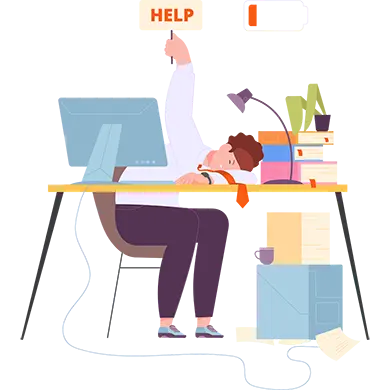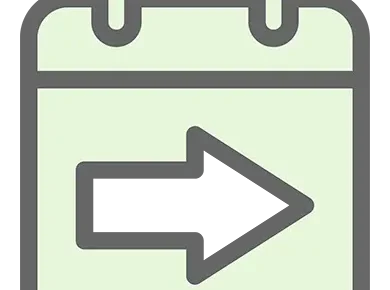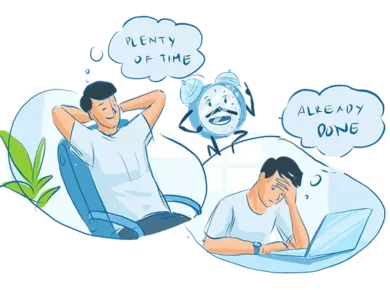De-stressing is the last thing on our minds due to our busy schedules. According to the American Psychology Association (APA), work is cited as the main source of stress by most Americans.
Similarly, a survey revealed that a lack of growth opportunities at work, long hours, and unrealistic job expectations as highly stressful.
The tragedy is that most of us do not even realize that we are stressed at work. There is some good news though. You can nip this issue in the bud if you are aware of the signs that you are about to burn out.
How We React to Being Stressed at Work
Stress has a lot to do with how we manage our flight and fight response. Take this simple scenario into consideration. You are swamped at work and you receive an email from your supervisor about an unsatisfied client. Since you are already swamped with work, your mind instantly responds to the additional stressor by flooding you with cortisol.
This is basically our ‘stress hormone’, which is supposed to warn us that we are in distress and need to calm down. Think of it as the engine light in your car, which starts flashing when the engine heats up. We do not have a warning light, but high-stress levels do trigger physiological reactions that can elevate the condition. So, when you get that email from your boss, you react. Your heart starts to beat faster, you start breathing in short spurts and tense up, all at the same time.
Then, the negative comments take over:
“I’m going to get fired if I don’t take care of this on time!”
“My boss hates me and is just looking for an excuse to fire me.”
“Everybody else in the team is doing a much better job than I am.”
To manage that anxiety and negative talk, you push yourself. You work overtime till everything is done and crash as soon as you get home. But, when you get up the next day, you more tired than you were the day before.
All of this happens because of a coordinated fear response that is supposed to warn us if we are in danger. Emphasis on ‘warn.’ Our heart rate starts to increase and the body tenses up, preparing us to flee.
We do not have to run away from predators in the modern era, but fear still triggers a strong flight response. Since we cannot run away, we allow that negative energy to build up. Then, we try to control it with more work for the sake of our jobs.
What’s really going on?
If you encounter stress at work every day, you can burn out. Being passionate about your job may get you a raise or a promotion. But, if you take it too far, that commitment can choke you.
The thing is, you will not even realize you are burning out till it is too late. Your time management skills will be one of the first things to go. At first, we enjoy the work, drive, and adrenaline rush as we challenge ourselves. However, when the pursuit of ‘excellence’ makes us forget our health, problems are imminent.
Here are some ways you can sabotage your health for the sake of your work:
You Try to Please EVERYONE at Work to ‘Avoid’ Work Stress
Does this sound familiar?
“I have to answer ALL of the emails today even if it means skipping lunch.”
“My contribution to the project is way more important than anyone else’s so I have to put in the extra effort.”
“I’ll just take over as team lead to prove myself to my boss and colleagues.”
We can be quite tough on ourselves for the sake of perfection when in hindsight, it does not really exist. Our thoughts often revolve around obligations, which we confuse for necessities.
Thoughts that start with “I have to…”, “I must…”, “I need to…” set us up for burnout, period. Instead of allowing ourselves to want certain things, we end up forcing ourselves to believe that we must have those things.
We fail to realize that some of the goals we are striving for may not be in our best interests. Pursuing them places more pressure on an already stressed out and exhausted mind.
What is causing this?
This narrative and tendency are coming from deep-seated insecurities that tell us that we are not enough. The hours we put in at work and how the boss treats us lay heavy on the mind long after we leave work. So, they remain top of mind when we return to work. In other words, we allow our brains to remain in a state of high alert 24/7. This disrupts our sleep cycle, leading to chronic fatigue, which, in turn, exacerbates our work stress.
De-Stressing Tips
Mindfulness is the key to de-stressing during this time. By consciously perceiving the thoughts that come into your head when you are stressed out, you can take the first steps to recovery and healing. It is the best way to shut off the autopilot mode we are in and increase awareness about our health.
One way to do that is through meditation. Here are some de-stressing ones you can do right at your workstation:
Wrist flexor stretch

Hold the fingertips of one hand with the other while sitting.
Then, extend the arm forward and pull your fingers back gently toward your wrist till you feel them stretch.
Hold for 5 seconds and then switch to the other hand.
Forward fold

Do a shoulder stretch and drop your arms to the floor and dangle your head down. Rest your fingertips on your toes and nod your head to release tension in your neck. Make sure that you place your weight on the balls of your feet. You should feel your hamstrings stretching pleasantly if you do this pose right.
Seated Tadasana

Stretch your arms up above your head, making sure the elbows are as straight as possible. Spread the fingers of your hands wide and think about drawing the thumbs back towards the back of your head. Soften the shoulders. Make sure your head is aligned with your torso and lift your chin back a bit to straighten your spine. Hold this position for three to five seconds before letting go.
You Rarely Get A Good Night’s Sleep to De-Stress
If work is piling up at the office and you cannot shut off your brain, you are bringing your worries back home. So, when you try to go to sleep at night, your worries keep you semi-awake till morning.
This reduces your chances of going into REM (Rapid Eye Movement) sleep. The phase should complete three to five stages to ensure we are well-rested. It should be ‘mentally restorative’ in other words. If you are able to get seven to eight hours of sleep, 90 minutes of that should be REM.
This type of behavior reduces our chances of getting healthy sleep. If we don’t reduce our workload, we have a harder time shutting down completely. This is why, even if you are able to get a full night’s sleep, you still feel in the morning.
De-Stressing Tips
According to the National Sleep Foundation, the key to a good night’s sleep lies in good sleep hygiene. Some of the practices that can help you maintain that state includes the following:
- Maintain a sleep planGo to bed at the same time every night and not a minute later. This practice will regulate your body’s internal clock and help you fall and stay asleep till morning.
- Maintain a bedtime ritualA relaxing routine will allow your brain to wind down. Read a book, drink a glass of warm milk, or do some light yoga before bed. It will reduce your stress and anxiety before you crash.
- Avoid napsA power nap may help you stay alert throughout the day, but it can wreak havoc on your sleep schedule. If you cannot fall asleep fast at bedtime, eliminate naps completely. That way, you will be tired enough at the end of the day to fall asleep quickly at night.
Stress has power over us only as much as we allow it to take over our lives, our work, and our relationships. While the aforementioned tips can help you to de-stress, do not be afraid to make some difficult choices if it means prioritizing your health and wellbeing. After de-stressing, improve your time-management skills with PlanArty or productivity tools and fulfill your goals without burning out.







